Three days after Dennis Wilson checked out of rehab in December 1983, he drowned off the coast of California's Marina del Rey at the age of just 39.
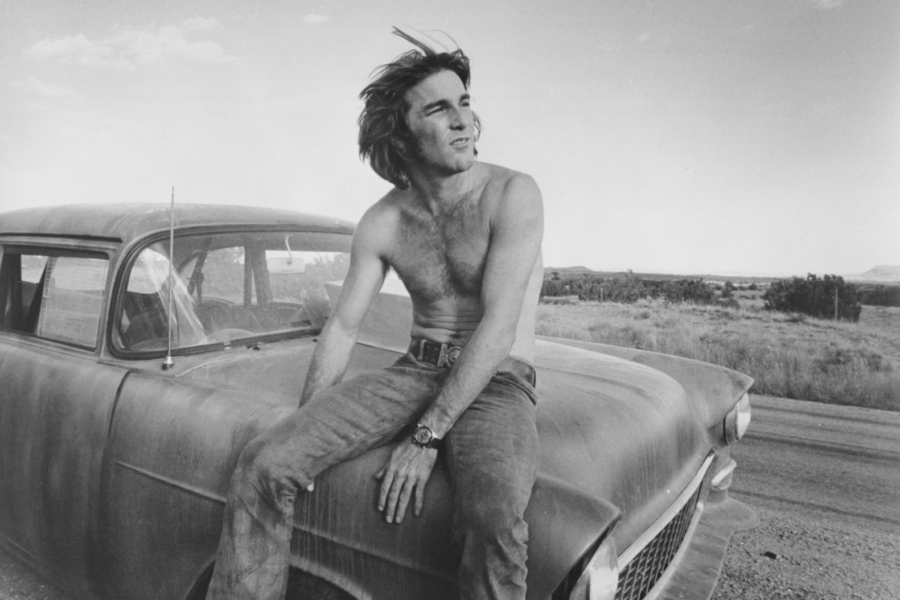
Wikimedia CommonsDennis Wilson, pictured in 1970, was the “wild child” of the Beach Boys.
It was Christmas Day of 1983, and instead of spending the holiday with family and loved ones, Dennis Wilson was in the detoxification unit of St. John’s Hospital in Santa Monica.
Wilson had co-founded the Beach Boys, the California surfer-rock group that topped the charts in the ’60s and ’70s. But his abuse of alcohol and drugs like cocaine and heroin led to his band members, including his brothers Brian and Carl, to give him an ultimatum: clean up his act or get kicked out of the group. That ultimatum came in September 1983, after what would ultimately be his final performance.
It seemed, at least at first, that Wilson was serious about getting sober. He did a couple of short stints in treatment centers between September and December that year. But on December 25, he checked himself out of the hospital and immediately began drinking again.
Three days later, Wilson drowned in the waters of Marina Del Rey, California after spending the day out on a friend’s boat. His blood alcohol level was .26.
Sadly, it did appear that Wilson was on the verge of a serious attempt to get clean.
“He said, ‘We’re going to the boat; we’re going to have a good time. And tomorrow I’m going to go to detox,'” Wilson’s friend Colleen McGovern said in an interview with Rolling Stone.
But he never got that chance. The Beach Boys’ “wild child” drummer Dennis Wilson died at the age of just 39.
The Early Life Of Dennis Wilson And The Beach Boys
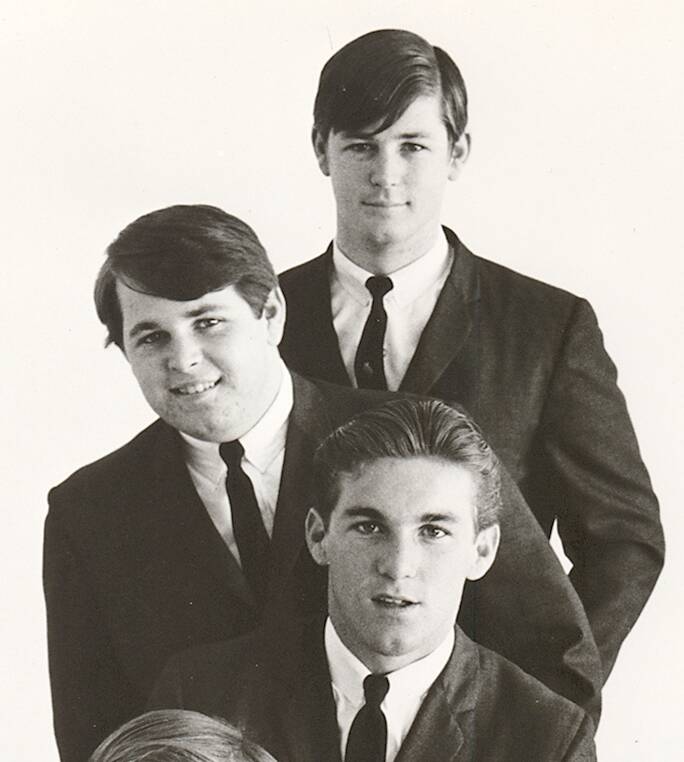
Wikimedia CommonsBrian, Carl, and Dennis Wilson.
Dennis Wilson was the middle brother of Brian and Carl Wilson, with whom he founded the Beach Boys. The brothers didn’t have a particularly easy childhood, as their dad was violently abusive to them. But Dennis, the self-proclaimed “black sheep” of the family, seemingly got it the worst, becoming his father’s punching bag.
“Dennis had to keep moving all the time. If you wanted him to sit still for one second, he’s yelling and screaming and ranting and raving. He’s the most messed-up person I know,” said Brian, according to author Keith Badman in The Beach Boys: The Definitive Diary of America’s Greatest Band On Stage and In the Studio.
The Wilsons’ mother forced Brian and Carl to include Dennis, who his friends nicknamed “Dennis the Menace,” in their band, which would in 1961 become the Beach Boys. While Dennis had been taking piano lessons, he initially wanted to play bass, before pivoting to picking up drumming, which he deemed “more exciting.”
The Beach Boys had their first local hit with the release of “Surfin'” in 1961, and their first national hit in “Surfin’ Safari” in 1962. With that, the group entered the mainstream of American rock music.
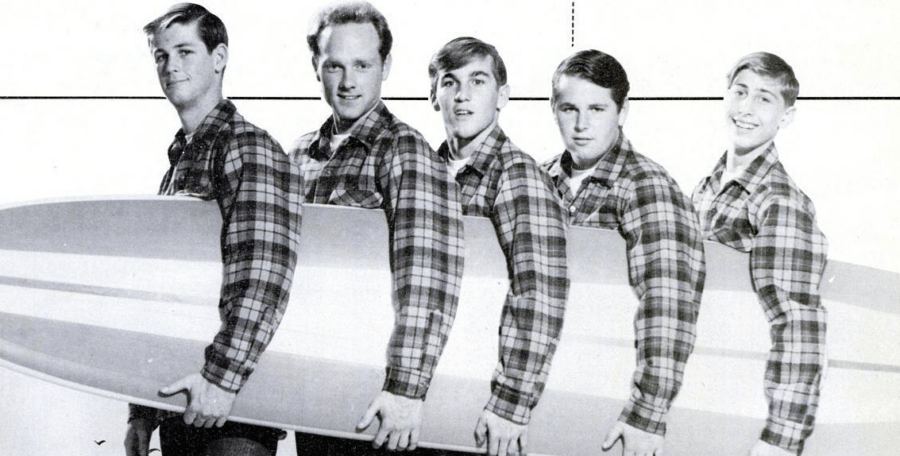
Wikimedia CommonsThe Beach Boys pose for a Billboard advertisement in 1963, with Dennis Wilson in the center.
Although the members all came from California, Dennis was the only surfer in the group. He was the one who suggested the theme of surf rock for the band’s sound.
“Dennis was the only one who could really surf,” Carl said, according to Badman. “We all tried, even Brian, but we were terrible. We just wanted to have a good time and play music.”
The Peak Years And Wilson’s Downward Spiral
The Beach Boys were at the height of their popularity in the mid-1960s. But the fame and the money started to go to Dennis Wilson’s head. He stopped showing up to recording sessions, and by 1966, he had started using drugs.
“I think as soon as the checks started rolling in, Dennis had other things,” said Hal Blaine, a drummer that repeatedly replaced Dennis in the studio, in an interview with Rolling Stone. “He was buying things; he was appreciating his motorcycling and hobbies and so forth. When you’re sixteen years old and you’re literally handed millions of dollars, you get crazy.”
Dennis was the “wild child” of the band, and he was the most popular with audiences — especially with the girls, which Brian said was sometimes “hard to handle.”
“The girls would be going ‘Dennis, Dennis’ and run right past us to get to him,” Brian said, according to author Jon Stebbins in Dennis Wilson: The Real Beach Boy.

Wikimedia CommonsDennis Wilson in the studio in 1966.
But despite Dennis’ unreliability and the tensions between the brothers, the band continued to be successful, and Dennis was given more singing leads on later albums. “Do You Wanna Dance?”, released in 1965, was the first A-side single with Dennis singing lead, and it peaked at 12 on the Billboard Hot 100.
“[Dennis] showed for the first time an awareness that his voice could be a blunt emotional instrument… His erratic croon cut straight to the heart, with an urgency that his more precise brothers could never have matched,” wrote journalist Peter Doggett in 1997.
Dennis Wilson’s Surprising Ties To The Manson Family
The Beach Boys’ popularity faltered in the late 1960s with the rise of British rock groups like the Beatles, and Dennis Wilson continued in his downward spiral, abusing alcohol, cocaine, and heroin.
Wilson was even associated with Charles Manson and the Manson family for about a year. After he picked up two girls that were hitchhiking in 1968, they introduced him to Manson. Wilson and Charles Manson even wrote some songs together.
“When I met [Charlie] I found he had great musical ideas,” Dennis Wilson said, according to Far Out. “We’re writing together now. He’s dumb, in some ways, but I accept his approach and have learnt from him.”
Wilson introduced Manson to some of his producers, and while Manson never got a record deal himself, Wilson reworked a song they wrote together for the Beach Boys, and it was released as “Never Learn Not To Love” in late 1968:
But as Manson got into heavier drugs and crime, Wilson distanced himself. Then, when Manson orchestrated the Tate-LaBianca murders in 1969, Wilson became terrified that he was next after receiving death threats from the Family. He refused to testify against Manson.
“I know why [he] did what he did,” Wilson said in the 1978 biography The Beach Boys and the California Myth by David Leaf. “Someday, I’ll tell the world. I’ll write a book and explain why he did it.”
“Some attribute [Wilson’s] subsequent spiral of self-destructive behavior ― particularly his drug intake ― to these fears and feelings of guilt for ever having introduced this evil Wizard into the Hollywood scene,” wrote Mark Dillon in the National Post in 2012.
The Events Leading Up To Dennis Wilson’s Death
By the mid-1970s, Dennis Wilson was deep into drug and alcohol abuse, especially after injuring his hand so he could no longer play the drums.
“Now, during concerts, the impulsive, physically aggressive Dennis would be reduced to sitting behind a keyboard or standing off to one side behind a microphone,” wrote Stebbins. “It hurt him deeply. He felt like a caged animal. His drinking became worse and his participation in the band became erratic.”
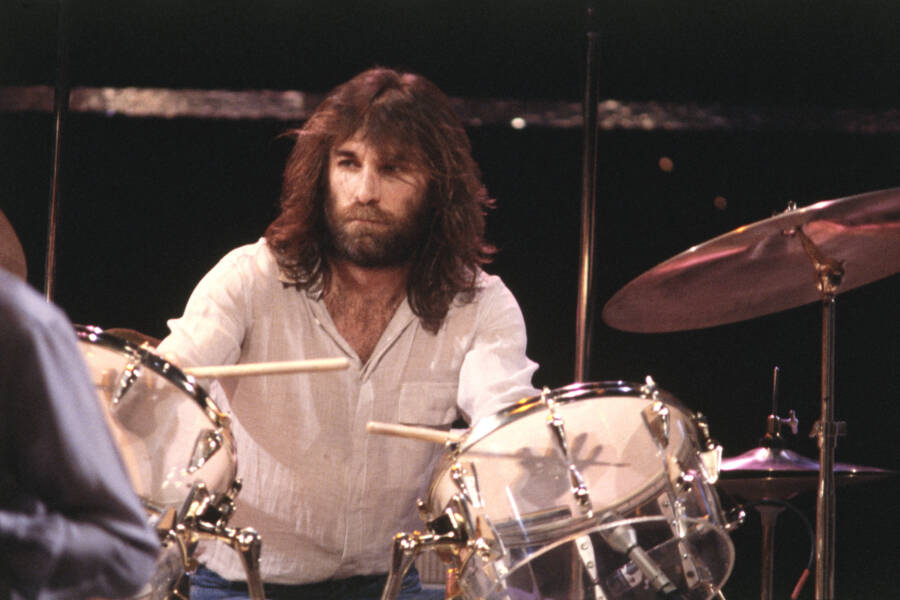
Pictorial Press Ltd / Alamy Stock PhotoDennis Wilson in 1976, after he recovered from his hand injury.
Wilson was constantly quitting the band or getting kicked out and then rejoining a few days later. By 1983, Wilson’s drug abuse had gotten so extreme that he lost his normal speaking voice and could hardly sing. That was when his band mates gave him the ultimatum.
He gave a half-hearted attempt to get clean, doing short stints in treatment centers. But they never lasted, and he would begin drinking again immediately after leaving.
On Dec. 25, 1983, he checked out of the hospital for the last time. He got in a drunken fight with his estranged wife’s friend within hours of checking out, and his friends attempted to get him back into the detoxification unit. The head of the program, however, saw Wilson as a lost cause.
“He’s just too much trouble,” Dr. Michael Gales allegedly told Chris Clark, a friend of Wilson’s, according to Rolling Stone.
“He may die, you know,” Clark told Gales.
“He might have to,” the doctor allegedly replied.
The Shocking Death Of Dennis Wilson
On the morning of Dec. 28, 1983, Wilson was out on his friend Bill Oster’s boat, The Emerald, drinking and partying with his friends and a new fling. Wilson reportedly starting drinking vodka at 9 a.m. — but Oster said that was normal for him, People Magazine reported.
That afternoon, Wilson started diving into the water around the boat, looking for possessions from his ex-wife he had thrown overboard on his own boat during his divorce three years prior. It was odd, but not especially concerning to his friends.
“He was in and out of the water, getting a kick out of all the stuff he was finding,” said Skip Lahti, the yacht manager.
“He was just being Dennis, entertaining everybody, being his lovable self, goofing around,” Oster said.
But after an hour of going in and out of the water, Wilson didn’t come back up. After a few minutes, his friends suspected something was very wrong.
“At that point, I saw him go straight down and back out of sight,” Oster said. “I said to myself, ‘That sucker’s playing a game on me, he’s trying to hide.’ That was my fatal error. Because that was the last time he went down.”
Remembering Dennis Wilson’s ‘Fast Life’ After His Death
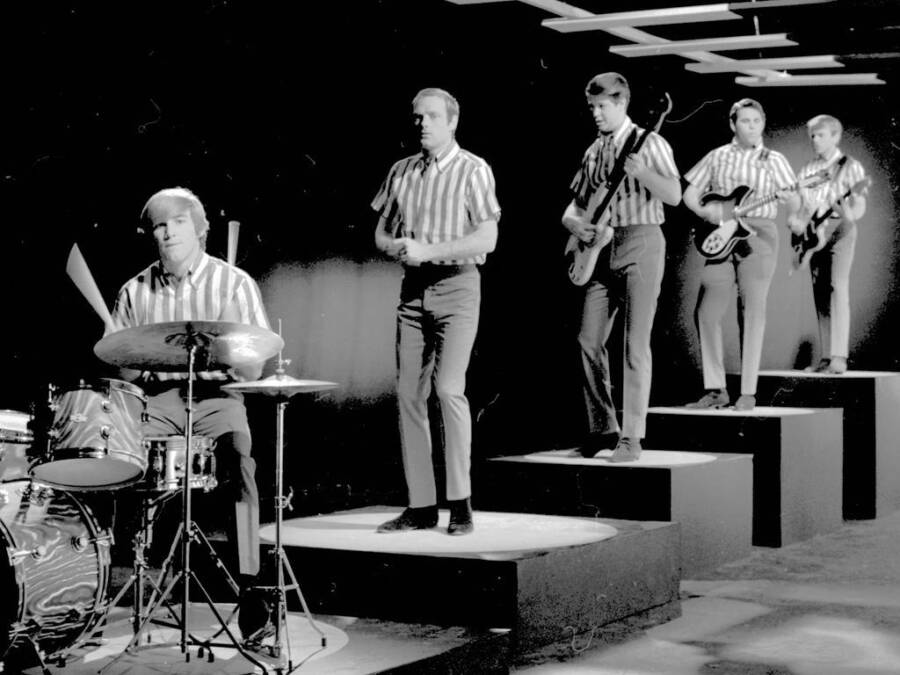
Wikimedia CommonsThe Beach Boys perform circa 1964, with Dennis Wilson on the drums.
Dennis Wilson left behind four ex-wives and five children after his death. He was laid to rest at sea by the U.S. Coast Guard in a ceremony usually reserved for Coast Guard and Navy veterans after President Ronald Reagan, an avid fan of the Beach Boys, intervened and gave permission.
“By all appearances the happy-go-lucky Beach Boy, Dennis Wilson lived out the proverbial live-fast-die-young motto,” wrote Tony Sclafani in PopMatters in 2007. “But… his wild side masked an underside that was, by turns, brooding, self-loathing, sensitive, and anxious.”
Wilson’s drumming can be found on some of the Beach Boys’ greatest hits, including “I Get Around,” “Fun, Fun, Fun,” and “Don’t Worry Baby.” He was posthumously inducted into the Rock and Roll Hall of Fame in 1988.
Dennis Wilson himself acknowledged the reckless nature of his life and foreshadowed his early death in the sleeve notes of the Beach Boys’ 1964 album “All Summer Long”:
“They say I live a fast life. Maybe I just like a fast life. I wouldn’t give it up for anything in the world. It won’t last forever, either. But the memories will.”
After reading about the tragic death of Dennis Wilson, learn more disturbing facts about his former friend, cult leader Charles Manson. Then, read the story behind the shocking death of Nirvana frontman Kurt Cobain.





